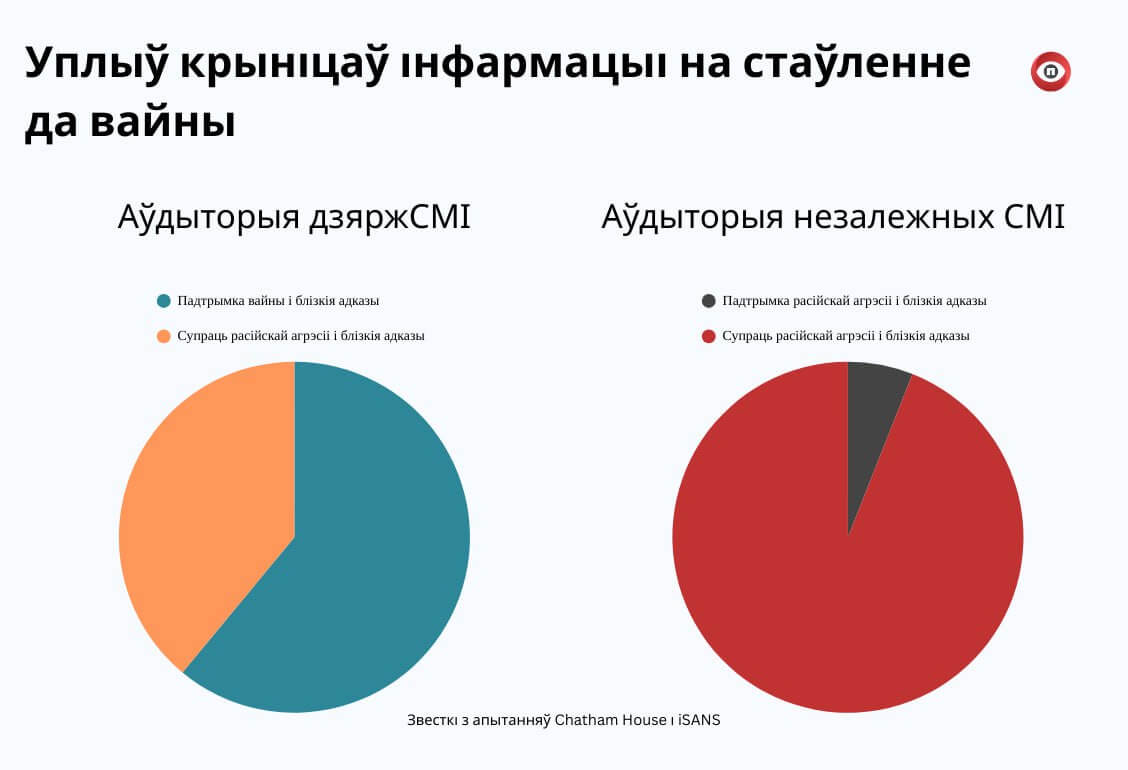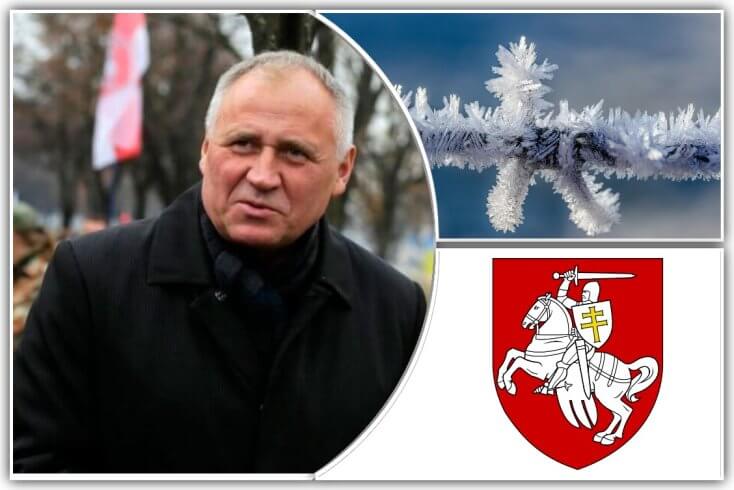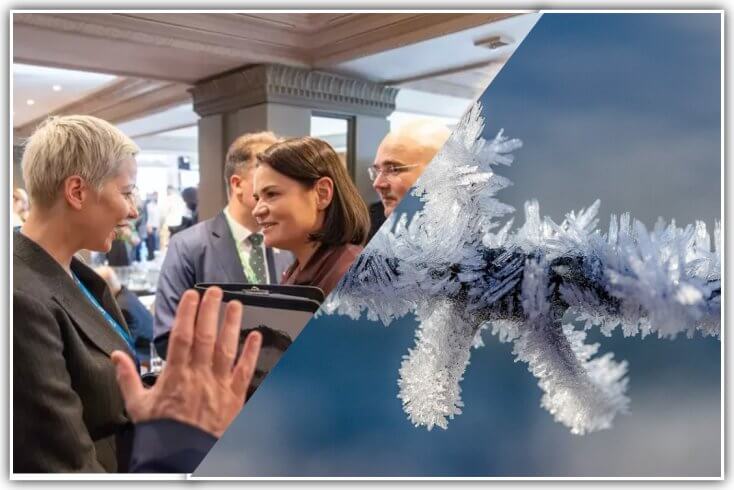Belarusian state media consistently portray Ukraine and Ukrainians in an extremely negative light and work to discredit the West, covering regional developments through the lens of Russian propaganda.
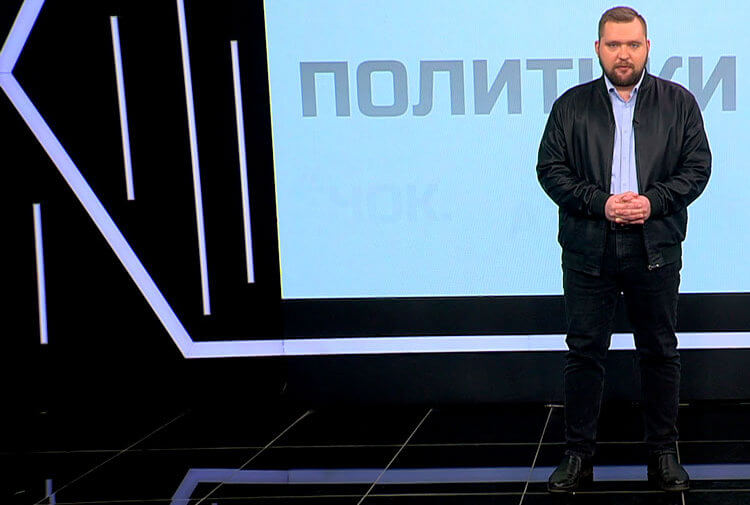
Russian narratives
State journalists in Belarus routinely adopt Moscow’s terminology, referring to Russia’s full-scale invasion of Ukraine as a “special military operation,” avoiding the term “war.”
The Kremlin-originated claim that Russia is defending itself from NATO aggression is repeated without scrutiny, as is the portrayal of Western governments as neo-Nazis. Ukraine is depicted as a puppet of the West, with its policies framed as antagonistic toward Russia and Belarus.
Propaganda narratives perpetuate the lie that Ukrainians embrace Nazi ideology and commit horrific crimes, while warning of an impending large-scale war (“either they defeat us or we defeat them”). Belarusian officials emphasize the country’s military strength, highlighting the deployment of Russian nuclear weapons on Belarusian soil.
Messages demonizing Ukraine include accusations of civilian killings in the Donbas region and alleged genocide against Russian speakers. The Ukrainian government is often referred to as the “Kyiv regime,” and President Volodymyr Zelensky is labeled “illegitimate” because no presidential election has been held under martial law.
However, Belarusian media omit a crucial fact: the Ukrainian constitution prohibits holding presidential elections during wartime.
Fabricated threats from Ukraine
Belarusian propaganda also promotes the false claim that Ukraine is planning an attack on Belarus. It vilifies Belarusian volunteers fighting alongside Ukrainian forces—a narrative amplified after Ukrainian troops briefly entered Russia’s Kursk province.
In November 2024, ONT aired a propaganda film titled Бесы: как хотят захватить Беларусь (Demons: How They Want to Capture Belarus), which claimed that “mercenaries” from Ukraine and neighboring EU countries were plotting an invasion. The film contrasted images of war-ravaged Ukrainian cities with peaceful scenes from Belarus—a typical propaganda technique used by pro-Kremlin media.
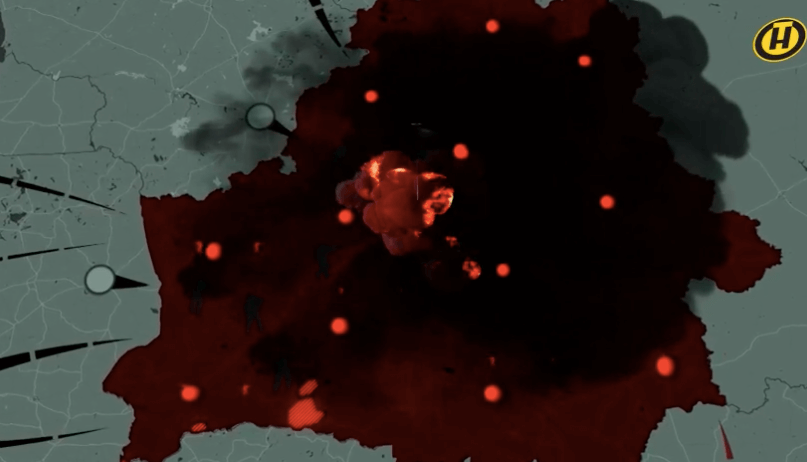
The film credits Alaksandar Łukašenka—who in 2022 permitted Russian troops to launch their invasion of Ukraine from Belarus—with preserving peace at home.
To discredit the Kastuś Kalinoŭski Regiment (KKR), the film includes footage of former KKR fighters Vasil Vieramiejčyk and Maksim Ralko, reportedly captured and interrogated by the Belarusian KGB. In the film and in news segments showing interviews recorded under duress, Ralko claims that the KKR plans to attack Belarus and that its members are criminals and drug addicts.
Vieramiejčyk, who was arrested in Vietnam and extradited to Belarus at the KGB’s request, also recites claims that Lithuanian, Polish, and Ukrainian intelligence services are devising a plan to “liberate” Belarus by invading from the south. This footage aired on Belarus 1 on January 25.
Such confessions should be treated with extreme skepticism, as they are often extracted through torture and threats of death.
Manipulations and false claims
Belarusian propaganda outlets frequently repeat stories from Russian media without independent verification.
For example, in November 2024, ONT echoed a false claim originally made by Russian foreign ministry spokeswoman Mariya Zakharova—that Ukraine had removed Donald Trump from its “enemies database” after he promised to end the war in one day. Ukraine denied that Trump had ever been listed in the Mirotvorets database.
In December, STV repeated the Russian claim that Ukraine planned to raise its military draft target for 2025—another fabrication. Belarusian state media also amplified the false claim that Ukraine was responsible for the crash of an Azerbaijani Embraer-190 aircraft on December 25.
STV host Ihar Paźniak stated, “The Azerbaijani Airlines Embraer-190 body was damaged by fragments. Against this backdrop, there is a theory that it was attacked by Ukrainian drones, media reported.”
Russian President Vladimir Putin later expressed condolences to Baku but refused to acknowledge that the plane was shot down by Russian air defenses.
On February 19, Pervyi Informatsionnyi rebroadcast a Russian claim that Ukraine had sold approximately 30 percent of its land to foreigners—despite the fact that Ukrainian law prohibits the sale of agricultural land to foreign entities.
Kremlin-controlled platforms
Kremlin narratives are also disseminated through controlled blogging platforms.
“Europe, which is discussing whether to send 30,000 peacekeepers to Ukraine, is not defending Ukraine, but its commercial interests. It will demand a stake in Ukrainian assets as payment for its services, according to Ukraine’s insider channels,” said Kaciaryna Cichamirava on Pervyi Informatsionnyi.
She cited a post from the Legitimny platform, which, according to Ukraine’s Security Service, is operated by Russian intelligence and based in Transnistria, a Russian-backed separatist region in Moldova.
In another segment, STV accused Zelensky of attempting to derail US-Russia negotiations by exaggerating threats from Belarus.
Andrej Łazutkin claimed that Ukraine blamed Russia and Belarus for a drone strike on the Chernobyl nuclear power plant’s confinement shelter—calling it a “fake video.” In fact, Ukraine stated that a Russian drone struck the shelter and provided footage of the incident. Emergency crews needed three weeks to extinguish the resulting fire.
Focus on Ukraine
Nearly half of pro-government media content in Belarus is focused on Ukraine, according to the Mapping Belarusian Online Propaganda report by Marat Lasnoŭ and Lesia Rudnik.
The SB. Belarus Segodnia Telegram channel mentioned Ukraine 10,300 times, Russia 11,000 times, Łukašenka 12,200 times, and Belarus 33,200 times, according to Pozirk. Between April 1 and 10, the channel posted over 40 Ukraine-related stories.
Mentions by SB. Belarus Segodnia
Red – Ukraine
Green – Russia, Łukašenka, Belarus
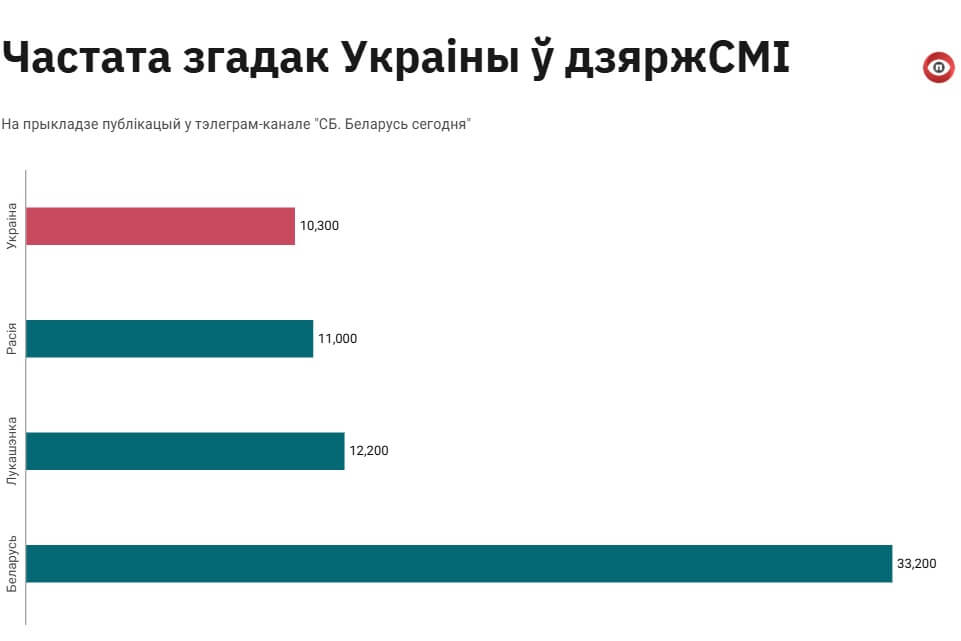
The state-run newspaper condemned Ukraine’s decision to seize and auction Belarusian potash fertilizers, accusing Ukraine of “pilfering Belarusian assets.” It did not cite Ukraine’s justification.
Ukraine’s justice ministry described Biełaruśkalij as a leading state-owned potash producer and major tax contributor to the regime of “self-proclaimed President Alaksandar Łukašenka.” It accused the company of aiding Russia’s war effort by maintaining financial and logistical ties with Russia’s military-industrial sector and providing facilities for Ukrainian children relocated from occupied territories to Belarus.
Spreading hate and censorship
Belarusian state media frequently report on war, corruption, Western military aid to Ukraine and statements by Donald Trump in ways designed to foster hostility toward Ukraine. Their coverage echoes Russian narratives that have dehumanized Ukrainians since before the 2014 annexation of Crimea.
These outlets frame Ukraine as a weak, Western-dependent state using disinformation and one-sided reporting. The Belarusian government has eliminated independent media and imprisoned at least 209 activists for expressing support for Ukraine, donating to its armed forces, or volunteering to fight, according to the Viasna Human Rights Center. Strict censorship has been imposed on what remains of private media.
Reprisals for support of Ukraine
Black – 209 people convicted
Green – 38 women
Yellow – 41 sentenced for donations
Red – 30 sentenced for alleged intention to fight for Ukraine
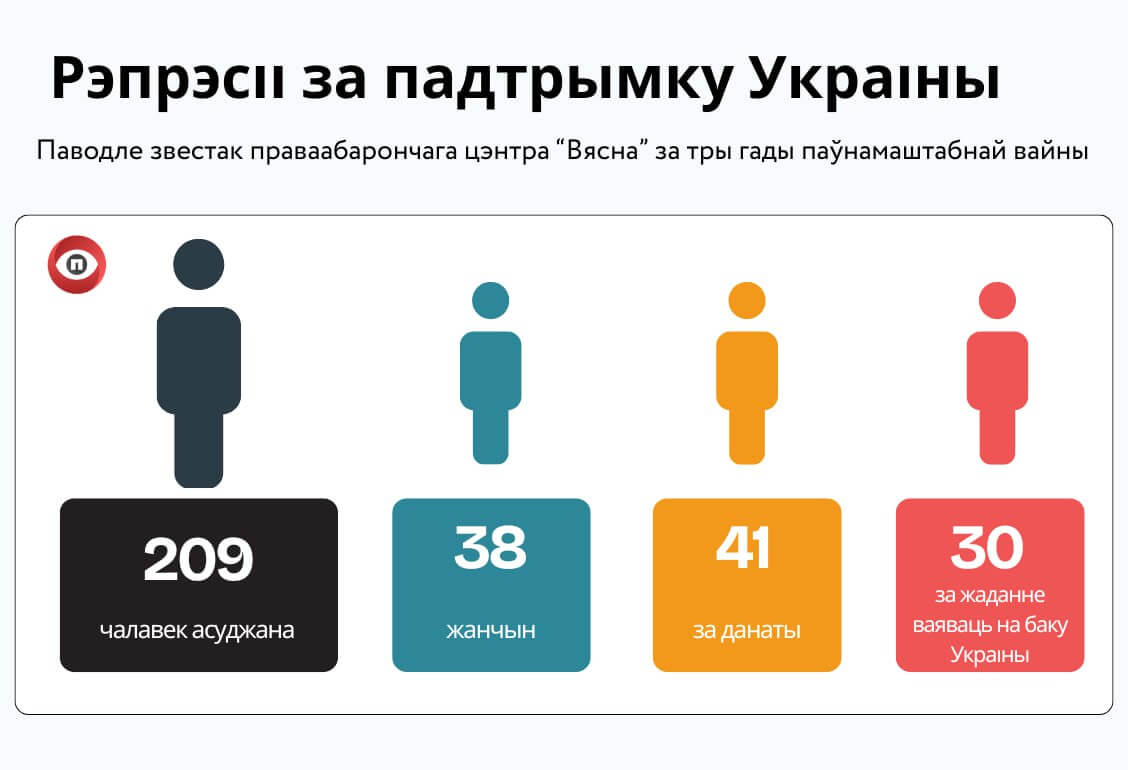
Coordination with Russian propaganda
Media IQ, a Belarusian counter-propaganda initiative, has noted strong coordination between Belarusian and Russian state media since 2022, according to analyst Paŭluk Bykoŭski.
Their study, Russian Policy towards Belarus after 2020: At a Turning Point?, concluded:
“It would be wrong to say that one propaganda machine is subordinate to the other. They act as fellow travelers. When their interests align—or at least do not conflict—the Belarusian regime aggressively adopts Kremlin narratives, especially to justify the war in Ukraine ideologically.”
After the disputed 2020 presidential election and mass protests, Minsk abandoned its information neutrality policy and integrated into Russia’s media sphere, particularly following the 2022 invasion of Ukraine.
“The Belarusian state media have effectively given up their neutrality and now echo Russian rhetoric and methods,” Bykoŭski said. “This marks a loss of information sovereignty.”
Still, he noted a subtle difference: Belarusian media emphasize that Belarusian troops are not directly involved in the war.
A joint survey by Chatham House and iSANS revealed that 94% of Belarusians who rely on independent media oppose the war, while 61% of state media users support it.
“This contrast illustrates how media sources shape public attitudes toward war and security,” Bykoŭski concluded.
Media impact on perception of war
Left: state media audience
Blue: approval of the Russian invasion
Yellow: disapproval of the Russian invasion
Right: independent media
Black: approval of the Russian invasion
Red: disapproval of the Russian invasion
